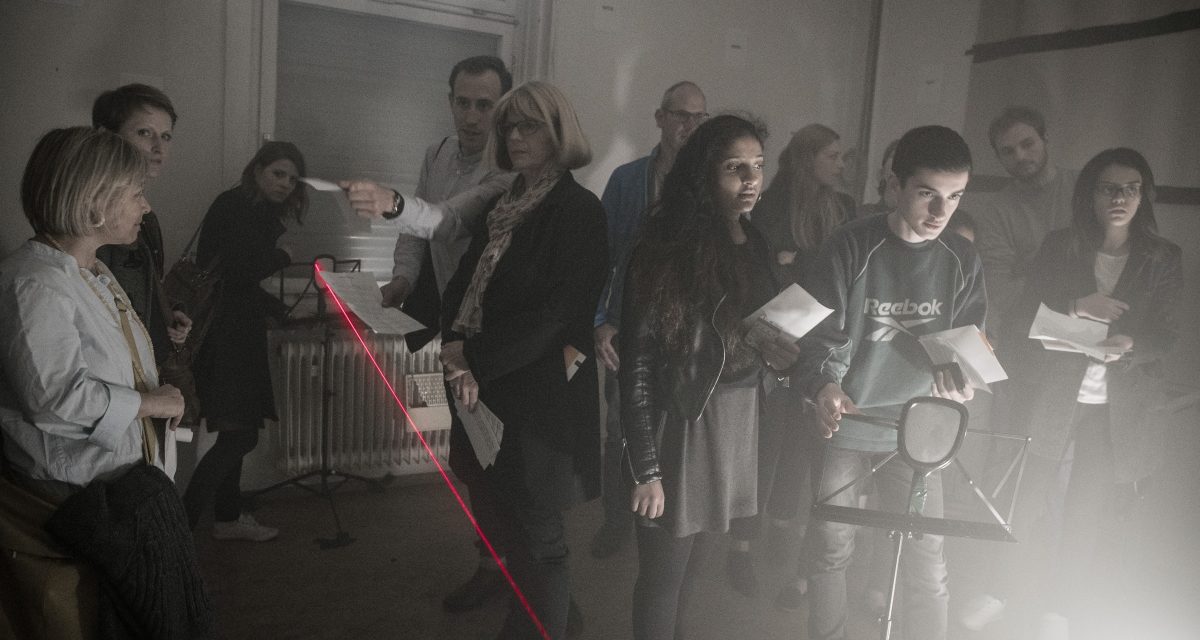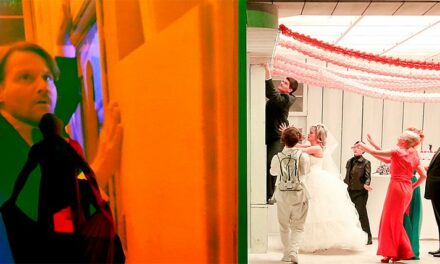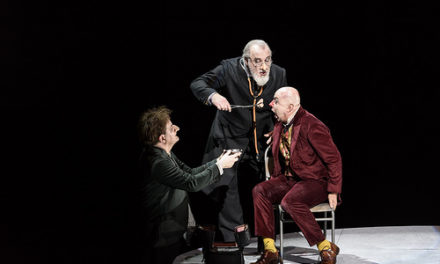Does good dramaturgy, as it was stated by Friedrich Schirmer, really need to be invisible? Jeffrey Döring, who works somewhere between theater directing, dramaturgy, and play producing, met with Carmen Kovacs, dramaturg of the Bavarian State Ballet in Munich, for an interview on the definition of a dramaturg, and what it means to be one.
Carmen Kovacs: Jeffrey, you’re working on the border of dramaturgy and directing, and you’re often a producer, too. But as I know you, you would say: it is not about boundaries that result from defining professional titles. It’s rather intersections within your thinking. A space of opportunity that looks different in every production. Do you have a problem with being labeled a dramaturg or director?
Jeffrey Döring: I have a problem with labels because they maintain certain power structures that do not suit me. After graduation, I noticed that the image of the dramaturg was connected to a certain hierarchy and (for me often terrifyingly) is still continued at many theaters. As living encyclopedias, dramaturgs are “nice to have,” can help with the directorial work, but can also be annoying with the many unpleasant questions and if necessary you can even dispense with them. It doesn’t matter if they are highly educated or experienced, in the end, dramaturgs are inferior to directors and hardly have the freedom to make decisions. The dramaturg still lacks agency. On the downside, directing means not only the work of staging but also being the boss and the “real” artist. I try to avoid the term “director” for myself, because it is too close to the idea of the artistic genius, and I avoid the term “dramaturg” because it does not sufficiently embrace my agency in the production process. That’s why I just say, I’m the artistic director or project leader. In concrete terms, this means that I’m building a conceptual framework, which very much corresponds to the position of a dramaturg. Then I work with the actors or singers, which is basically the director’s position. And then I also make sure that the different trades have the right conditions to work well, which actually makes the producer.
CK: Wouldn’t you be better off in collective theater work? Where everyone takes on a variety of tasks and none of the artistically involved people is identified with his or her position? Would that be an alternative or even an ideal for you?
JD: I admire groups in which everyone does everything. But I am also a friend of division of labor and expertise. Especially because in my projects I try to install certain media in which I’m not an expert at all. At a certain point, it’s about skills. As an expert myself, I invent structures and images, rearrange things. I see the individual parts and try to merge them into a composition. There is a basic structure that I want to arrange, a jigsaw puzzle, so to speak. But the pieces are made by the performers and all other trades.

Schule Der Sehnsüchte, a participative site-specific performance, Winterlingen 2016 | Photo Credits David Klumpp
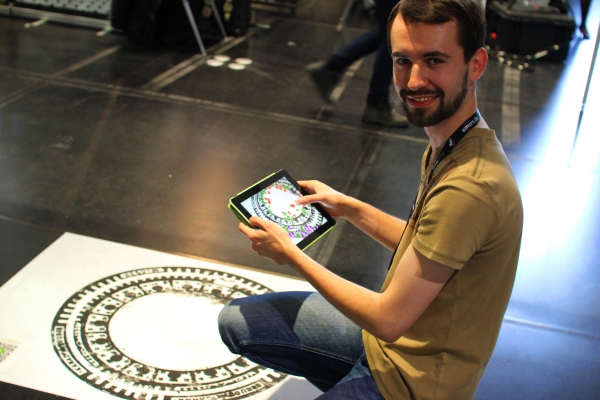
Sprout The Word, an augmented reality experience, FMX Stuttgart 2014 | Photo Credits Jana Beyer
CK: Something like that probably demands or generates a high degree of personal responsibility and motivation of all persons involved…
JD: Enormously. Everyone has to bear the entire project in mind and think for oneself and be creative for oneself. And sometimes that can be overwhelming if you’re not used to it. Of course, there are actors and actresses who have big problems if I don’t tell them what to do. On the other hand, I also experience that artist value, it very much being irreplaceable in their interpretation. Sure, if there are ten different opinions at the end, one must make the decision – and I can do that as well.
CK: But the great thing is that there are opinions at all. I can imagine you well as a communicator. Do you feel this mediating function as an interpersonal competence or as an artistic task?
JD: This is often an interpersonal issue – people have to talk to each other. That would even be the job of a classical dramaturg who doesn’t only accompany the production as a consultant and critic but also tries to bring the trades together, especially if there is more than just direction and stage design.
“In my opinion, if we want to head for an intermedial and future theater, the education of dramaturgs requires that you sometimes build a stage or arrange a sound file. We have to widen our understanding of what theater or art can be.” Jeffrey Döring
CK: Most of the time there’s more than stage design in your projects – it can get fancy: sound design, motion design, or interactive objects. You have your things that you care about. Is it permissible to bring such pronounced self-interest?
JD: It depends. As a director, you should develop a strong individual signature, which is coupled with specific interests and aesthetics. But according to the current opinion as a dramaturg, you should not have strong interests, so that you can better adapt to the thinking of others. When I studied dramaturgy, the image of the “invisible dramaturg” always hurt me. For example, in the description of the degree program at the academy in Ludwigsburg, the dramaturg is called the midwife of the theater project. So he or she does not carry the “baby” and is not even involved in fathering. To take the metaphor further: the dramaturg’s gene pool is not in the project. But then I wonder why would someone learn this profession at an academy for arts?
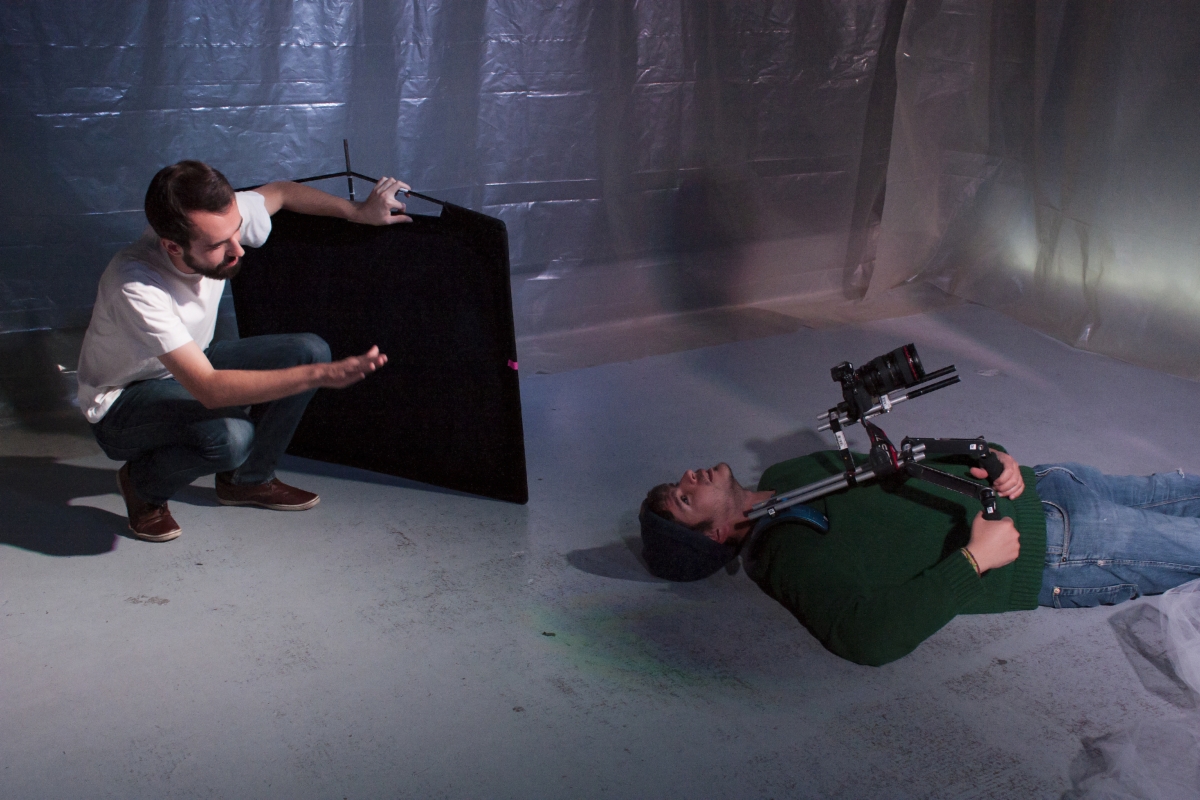
Rat Krespel, an opera for deaf people, Stuttgart 2016 | Photo Credits Pauline Branke
I want to make a strong point that the qualities of the dramaturg are very valuable in an artistic way. Artistic work has to be questioned. But for that you have to have an impact, use your voice, and take an unequivocal stand (if necessary, even against the director). A silent and invisible “Mister Cellophane” cannot be a productive part of a creative process. And in order to become an expert in a certain field, you must follow your interests and deepen them. Only then the “manager of other’s ideas,” as the dramaturg is too often understood today, becomes an independent creator, creative inventor, and autonomous artist.
CK: In your opinion, what qualities do you mean? And what would you like to change in terms of dramaturgical study?
JD: What does not correspond to my idea of dramaturgy within the education is that it is actually very much about text interpretation, paperwork. Very rarely it is about creating the breeding ground for understanding each other – especially the working methods in the field of new media. Everything has its own dramaturgy – every artistic practice, but also fashion, cities, industrial products – simply everything in our everyday life. And there are multiple languages to communicate these methods and plans of structuring in the different fields. So as a young dramaturg who doesn’t only want to be an assistant of a director, you have to learn how to see these different dramaturgies, these different ways to think about structuring, inspiration, and artistic work. And you can’t do that only by theory, but by doing. In my opinion, if we want to head for an intermedial and future theater, the education of dramaturgs requires that you sometimes build a stage or arrange a sound file. We have to broaden our understanding of what theater or art can be and especially what our profession as a dramaturg includes and what not. My point is to understand that dramaturgy takes place in so many things, even in our everyday lives. Learning to sense these structures can be the quality of the dramaturg. In that case, dramaturgy is also more of a discipline than a narrow professional field.
This article was originally published on Schloss – Post. Reposted with permission. Read the original article.
This post was written by the author in their personal capacity.The opinions expressed in this article are the author’s own and do not reflect the view of The Theatre Times, their staff or collaborators.
This post was written by Carmen Kovacs.
The views expressed here belong to the author and do not necessarily reflect our views and opinions.

